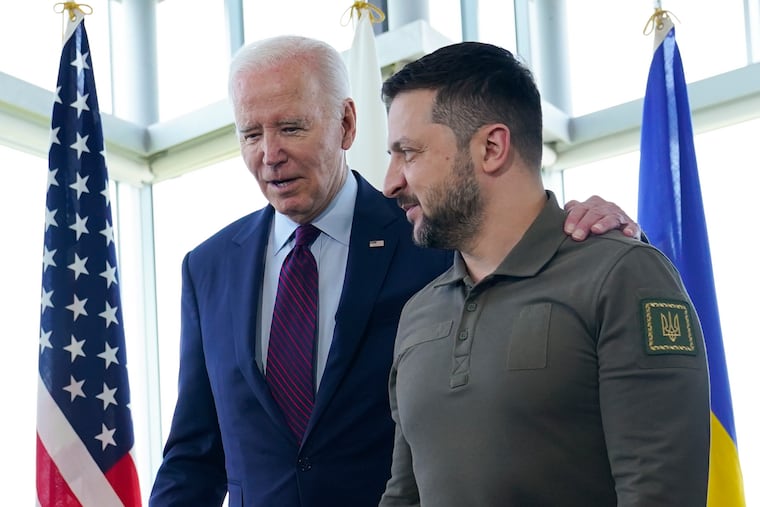Why Ukraine’s fight is America’s fight
Many Americans support Ukraine, but too many fail to understand that Kyiv is fighting authoritarianism now so we won't have to later.

On my recent trip to Ukraine, I met with a friend who is now a commander on the front line, someone I highly respect and have known since before Russia invaded last year. He posed a question I think Americans should ponder.
“Why don’t Americans have optimism about Ukraine?” he asked me in a darkened restaurant in a frontline city. “Americans fought for independence against the most powerful empire at that time, the British, who had the world’s best military. Many of the American fighters were farmers. Yet you won. So why don’t you believe in our fight?”
Of course, many Americans do support Ukraine. But too many fail to understand that Ukraine is battling a dictator, Vladimir Putin, who longs to restore the Russian empire.
Putin has declared that Ukraine has no right to exist as a sovereign nation. He already claims to have “annexed” four Ukrainian provinces, giving him control of the country’s seacoast.
» READ MORE: Ordinary men, extraordinary heroes: Inside Ukraine's 74th Battalion | Trudy Rubin
Ukraine is not, as many critics would have it, fighting NATO’s war on behalf of Washington. It is fighting its own war of independence. And contrary to the claims of many MAGA Americans and even some progressives, this struggle is important to the United States.
Of course, there are considerable historical differences between our war for independence and Ukraine’s fight for survival.
Russia has a massive superiority in murderous weaponry that was unimaginable in the 18th century, including nukes. (Kyiv gave away its nuclear weapons to Russia in 1994 in return for the Kremlin’s promise to respect its sovereignty.)
However, Moscow’s brutish strengths underline the David vs. Goliath nature of the struggle, not unlike the unbelievable chutzpah it took for America’s ragtag patriots to take on the Brits.
Moreover, just as colonial American patriots were a different breed from the Brits, despite a shared history, most Ukrainians are very different from Russians.
Those differences have enabled the Ukrainians to advance as far as they have.
Russians are mostly fighting because they have to or for money. Ukrainians are fighting for their country’s freedom from imperial domination.
In Russia, all major decisions must be approved at the top, discouraging military initiative. Russia’s fight depends heavily on ethnic minority draftees and convicts.
Moscow is indifferent to its own casualties, using a “meat grinder” approach that dispatches tens of thousands of Russian troops to certain death. As for the Russian public, most of it blindly follows the Kremlin.
Ukraine, on the other hand, has mostly encouraged initiative on the front and fighters have often seized it. I was told repeatedly by frontline soldiers that they believe their fight is existential. They have no doubts about what horrors they will face if Putin is able to destroy their state.
Unlike the passive Russians, Ukrainian civilians are deeply engaged in the war, volunteering at every level — from delivering food to old folks in half-destroyed villages to raising funds that purchase drones for the military units.
And Ukrainian techies, along with IT specialists who serve at the front, are spending their spare time — and often their own money — to develop new technologies and new weapons to offset their numerical disadvantages.
Their innovative sea drones, for example, have become key to the fight.
Ukrainians are from Europe, part of the democratic orbit that the United States is still (albeit limpingly) leading. Putin’s Russia is from the orbit of China, North Korea, and Iran.
This brings us to why Ukraine’s independence war should be embraced by Americans for strategic as well as moral reasons.
Ukrainians are fighting for us as well as for themselves.
As one soldier told me near Zaporizhzhia, “We are the boundary between Europe and Russia.” He meant the boundary between the democratic West and the authoritarian East.
Putin has failed miserably to develop his own country and has allowed it to fall into despotism dependent on selling discounted energy supplies to big brother China. To compensate, he is trying to change the rules of war and peace that have prevented another world war since 1945.
And China will learn lessons from how well the Russian leader fares.
Will Putin be allowed to dominate and destroy a sovereign, democratic nation? Will he be allowed to take military control of international Black Sea waters even though he has no legal right to do so? Will he be allowed to commit the most heinous war crimes with no repercussions?
» READ MORE: As Russian missiles again rain down on Odesa, Putin sneers at the U.N. and NATO allies | Trudy Rubin
If the answer is yes, we are in a new era, an era in which Putin feels free to further disrupt Europe and the U.S. His variant of extreme populist nationalism is gaining traction across the world — including in America, among MAGA Republicans and evangelicals. And, of course, he is admired by Donald Trump.
So when my Ukrainian friend asks, “Why don’t you believe in our fight?” my reply is that we ignore Kyiv’s struggle because we misread history and fail to foresee the future.
President Joe Biden’s reluctance to expedite the delivery of weapons systems such as ATACMS long-range missiles and F-16s (which are still being slow-walked) becomes even more inexplicable.
So does the growing, unsourced criticism of Ukraine’s slow counteroffensive by U.S. officials, which never mentions that the pace has been stalled by U.S. reticence in providing key weapons systems.
We should support Ukraine’s victory not just because there are historical parallels between their struggle for freedom and our own. We should support them because the parallels continue today: Kyiv is fighting authoritarianism now, so we don’t have to further down the line.